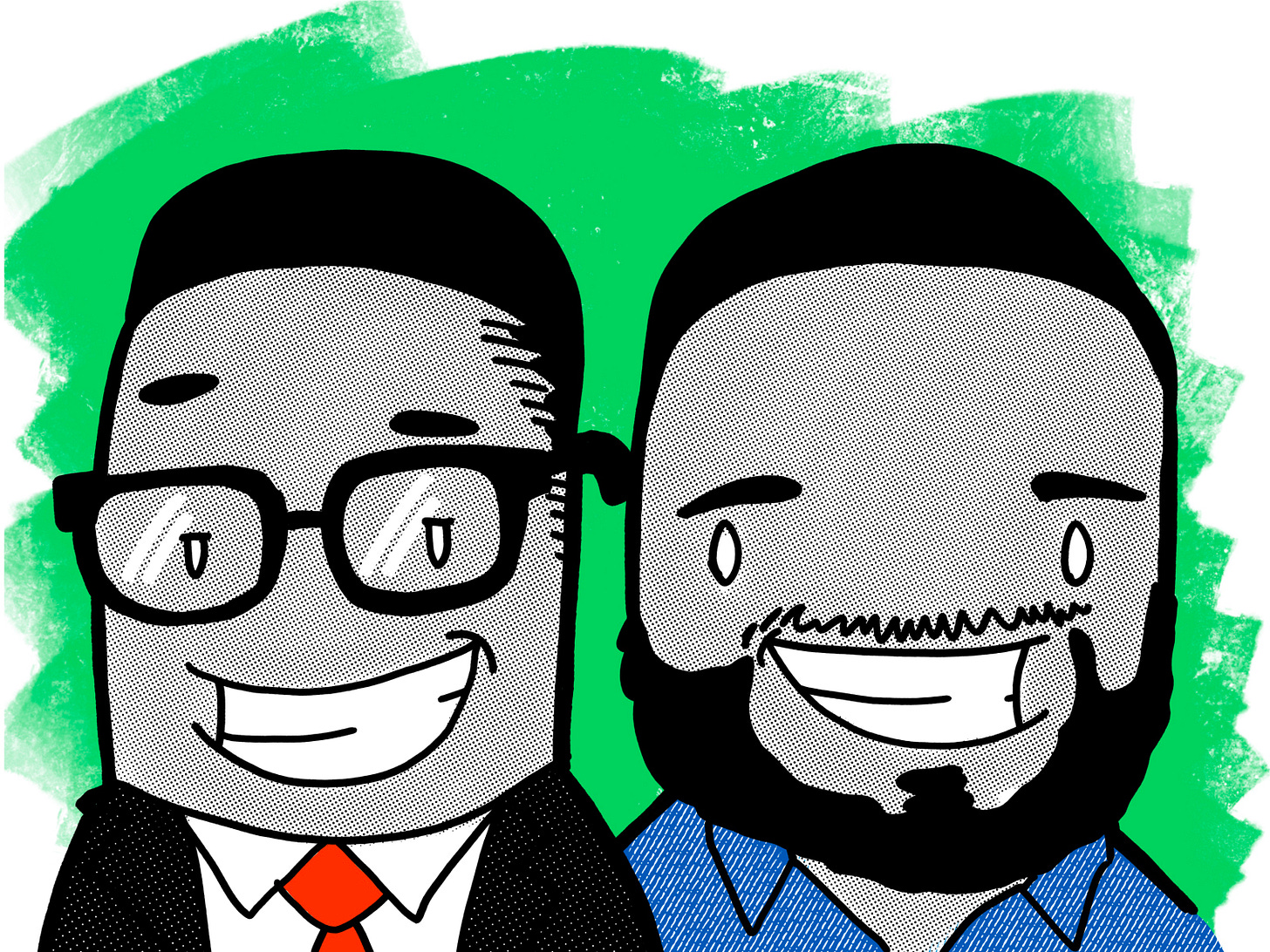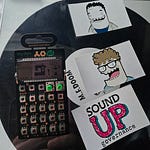TRANSCRIPT
Matt VO
Welcome back to Sound-Up Governance. This episode ended up being a bit less polished than normal. It was super early in the morning, and I didn't have most of my typical recording setup, which is all good because I was so excited to talk to my guests that I wasn't going to let any small obstacles get in our way...even if the flow and audio quality were a bit janky. So who are my guests? Alexander Sinora, the co-founder of Black Wealth Club, and Perry Chuinkam, who's on the BWC steering committee. I have a lot of annoying habits, and one of them goes like this: whenever I hear anyone talking about cool people they know I say, "Hey, can you introduce me?" Which is precisely what I did when my friend Dan O'Shaughnessy mentioned the Black Wealth Club. Then I connected with Alexander, a fellow bass player, who connected me with Perry. And suffice it to say they are basically the most interesting and fun dudes I've met in a long time. Let's learn more. Here's Perry, whose job title is Vice President in finance, technology and operations at Morgan Stanley.
Perry Chuinkam
I'm from Cameroon born in Cameroon then grew up in Cameroon, Gabon, the US, England, Spain briefly, and ended up in Canada where I've spent a long time now. My background like in terms of academic interests were computer science, electronic engineering, nuclear decommissioning, accounting, finance, and that weird mix of things led me to first working as developer for a couple of years, then not wanting to code as much, so moving into a space where I work on optimizing technology infrastructure costs internally at the bank. I'll tell you that like where I feel like I add the most value is thinking strategically, but also being able to add process to that. So implement it with process. I was reading Alexander Hamilton's biography, they described him as someone who was a thinker and a doer. If I can one day be described as a fraction of what he was, that would be great. But that definitely resonated with me like the passion for thinking but an equal passion for trying to put things into place to operationalize things. That sort of takes the story to a few years ago, where the Black Wealth Club was founded. And because I always have a lot of questions, and I'm not shy about asking them, I spoke with the co founder, Alexander, shared some of my thoughts how I thought we could optimize it and things and operationalize them. And he was like, "okay, like, let's do it!" And we've been spending a lot of time together, ever since. Much to my regret.
Matt VO
And with that little dig, we're starting to get a sense of the fact that these two guys are really close and really fun. So on to Alexander, who's the co-founder and vice chair of Black Wealth Club,
Alexander Sinora
Born and raised in Montreal. I studied in accounting in university. But you know, I think it was interesting, it's a kind of skill that are relevant, but I didn't want to become an accountant. So during my time at university, I started a marketing agency. By the end of my degree, we merged with an event company. Once I was in that event company, I was doing business development. So looking for like sponsorship, and then one of the sponsors that I was trying to get was Deloitte at the time. Created a beautiful relationship with one of the main partners from the Montreal office. And he was like, "hey, like, have you ever thought becoming a consultant?? And I was like, "No, but you know, why not?" So I started my kind of journey into management consulting by this connection. At Deloitte I was mainly implementing ERP system, workday, more specifically for the HR and finance functions for the financial industry.
Matt VO
ERP system stands for enterprise resource planning system. It's a type of software that organizations can use to share data among different processes like HR, financial, manufacturing, etc, to help make sure that stuff gets done well.
Alexander Sinora
And then after that, I joined McKinsey. So I was doing a lot of like innovation work, new businesses, for you know, big incumbents and all that and also worked a lot in the consumer space. And then at the same time, what happens that I met Paul Desmarais III. We built the Black Wealth Club together. Now it's sort of third year, and I've been working a lot on that. And right now what I'm doing, I'm just, you know, somewhat of an entrepreneur just doing you know, different things, from consulting to leading the not for profit and working on different ideas that I really want to bring to the world. So that's what I've been doing for the past, you know, five, six years.
Matt VO
Okay, so I'm sure it's obvious by now why I'm so excited to have these guys on the show. It's like between the two of them they cover essentially every impressive bit of lived and work experience that I could possibly imagine. And I haven't even gotten to the fact that they're also dedicated entrepreneurs working together on a startup called Hoops. But before we get there, we need to understand the Black Wealth Club. The headline on the BWC website reads, "Where emerging Black leaders go to learn about creating wealth and reinvesting it in their communities." Alexander mentioned that he founded BWC, with Paul Desmarais III, a hugely influential Canadian businessperson and philanthropist whose family is best known for owning and operating the massive Montreal based financial services operation Power Corporation. Here's a bit more of BWC's origin story,
Alexander Sinora
One of our close friend, his name is Nicholas Johnson, he became the first Black Valedictorian at Princeton. Paul Desmarais is super Canadian centric when he says talent, right? Like when he sees somebody that is talented, going somewhere else, like, "Hey, you should actually work with us, there are so many great things that we can do, why not?" So he contacted him when he saw that nomination. And you know, he was really impressed by what he was doing. And at the same time, he was like, hey, like, you know, there was the murder of George Floyd? And then he was like, "Is there a way that I can help someone in Canada? Or like, are they Black community in Canada?" And then my friend was like, "Hey, you should actually talk with Alexander. He's more involved in Canada than I am." So obviously, read the message on LinkedIn from Paul saying like, hey, like, I heard that, you know, we should actually discuss. Which was crazy, by the way, like, this is the craziest thing, you know, that probably happened to me in the past three years. And then the next day, or like, two days later, we jumped on a call. And then we started, you know, just to chat and to get to know each other. We saw that we had a lot of things in common. And, you know, when he was asking me about how can I help the community in Canada? I told him that, you know, I'm not the spokesperson, for like the community. However, there's one thing that I realized being at McKinsey, Deloitte and all that there's not a lot of Partners that looks like me, and I was like "it would be awesome to have my community having your network, and vice versa. Like, I'm sure you will gain a lot, you know, out of it as well." And that's how it kind of started. So we brought a group of 50, for the first cohort 50 young Black leaders across Canada, and we started that journey. And now it's our third cohort. So we are at 150 different individual, as a member in our in our not for profit,
Perry Chuinkam
Two tiny things to add on that subject. So the first is, when I saw it, what really appealed is ever since I moved to Canada, I've always asked, like people I'd run into, especially people in the Black community, like, "where are the entities where professionals in our space sort of congregate, just get to share ideas, work on things, etc?" And I hadn't been able to find it, there had been things that had popped up and disappeared over the years. But I always found them to be a bit too social. Right? So that's what made this something that I felt, okay, this is something I'd want to commit time to, because it was it was very much aimed around growth, and also around giving back. Right. And then the second thing very early on, that helped me. So if I, my interest in being a part of this was like the very first meeting with Paul, I asked him, I was like, "why don't you just go help like the people directly in the community that need help?" Because I was like, hey, like, more or less, everyone in the cohort is going to be okay. Right? And his answer was very honest, as his answers usually are. And he was like, "Hey, I don't know them. Right? I just, I just don't. It just happens that I don't know what they need. And also, like, the strongest resources that I have, can probably help professionals better and faster." right. And then, so he was like, then you folks in the cohort, it's your responsibility to pay that forward, and help your community because you know, your community. And I was like, that was an honest answer. It made a lot of sense. And it was geared around having maximum value, added value. So it resonated.
Matt
So, describe this is maybe not the right way to put it. But what do... describe a like typical member of a cohort. I mean, where are these people coming from? What are they doing at the moment that they become part of your world?
Perry Chuinkam
First, I'll explain the diversity of the group out of that briefly. And I'll just try to hone in on what a imaginary member looks like. Right. So we're Canada-wide and we also have folks in the US that have a strong Canadian affiliation. So basically, they're Canadian and happen to be building their careers in the US a couple in Europe as well. Right? We find that it's folks, a couple of years removed from university all the way to mid career, right. And we find that these are people that are diligent and committed to making the most out of themselves. Equally importantly, and this is one of our key recruiting criteria is they have shown a commitment to giving back to the best of their ability at whatever stage they've been in. And that giving back piece is truly important, because the example I always give is that if everyone drinks from a cup and doesn't pour any water back in, it's going to get empty. All right, and what we've seen is in other spaces, and other times, groups that were aimed to serve a particular sub segment of the Black community sometimes did not get the goodwill and faith of the broader community, because they they came across as self serving. And we wanted to make it clear that our commitment from day one is to do our best for the broader community. Right. So with that broader context, we find that it's typically a couple of years removed to mid career, it happens to skew towards people in professional tracks, but we're very deliberate about having creatives as well as people that are really selfless about giving back, but also incredibly focused about making themselves better than where they started. Those are sort of the recurring characteristics of the group.
Matt
Anything to add, Alexander?
Alexander Sinora
I think, I think this is really a good answer. One thing that we hope in terms of our members is that they really, like speak freely in terms of like, their opinions and what they think everybody, you know, it's kind of like a safe space of just like talking about different things and believing different things. And when we bring, you know, the different speakers that we're bringing, we hope that you know, people are, if they don't agree with them about that people feel like they're in the right place to like, "hey, like, I don't believe in that." And just like saying it whoever they are. So we hopefully, as cliche as it sounds like hope that these are a bunch of like free thinkers that, you know, has their own opinion and a backbone.
Matt
So what, by your assessment, is the impact so far of the organization, whether it's at the individual level, or regional level, or systemic level, or whatever the right lens is, what's the impact been?
Alexander Sinora
I think at the individual level, a lot of people I think, you know, really accelerated a career or had the connection required to do or to push wherever ambitions that they had, I truly believe in that. The next thing in terms of like social impacts, so like, One of the thing that I want to make sure, when we started that organization is that I hate doing whatever is already out there, like at this point, you just join them. It's a it's a waste of time. So one thing that we're really good at is working with other organizations and doing things together. So in Toronto, for example, we had a conference two weeks ago, about 350 people at the MaRS Discovery District, bringing all the ecosystem around like entrepreneurship to the same place. So social impact is really a way to bring different partners together to actually work, you know, once again, together to make things happen instead of just doing it just to do it. So yeah, I think this is kind of, you know, the dual mission that we have, and this is why we really believe in, and hopefully that personal ambition can become a net benefit to everyone else throughout the different kind of initiatives that we have and the things that we're doing. So when, you know, talking about that event, one of the things that we believe is that by working with talented people, things get done really fast, right? So that event that had like 350 people of the ecosystem took maybe like, three months, and like three months like part time. Everybody like has their own job. They're like investment bankers, consultants, they don't have time. But the little time that they have, if you're working with incredible individuals, like magic can happen. And we're super proud of that.
Matt
And so if that's the impact so far, tell me a bit about where it's going, or at least where you imagine it could go.
Perry Chuinkam
Another great initiative that we're proud of is we have this university outreach subcommittee, which was started by a couple of members that said, "Hey, we had trouble coming out of university, understanding how we were supposed to maneuver throughout our student careers, to have the resumes to get into the industries we wants to get into, and we don't want the next generation to have that." So through that subcommittee, we've built out coaching, mentorships, entire sort of game plan and roadmap for a variety of industries. And we recruit cohorts of first and second year university students, and we tell them that "hey, work with us for the next couple of years. We're going to help you understand what you need to get academically. Like where you need to be involved extracurricularly to build the bona fides that will enable you to get the internship in the industry that you're seeking to get the second internship to get the full time offer." And we've had tremendous success with that we're very proud of it. Like a month ago, we had an on site with those students, right, where we brought them into a room for half a day, like and walk them through, like everything from this is how you should be networking to this is which club you should be applying for, if you want to do consulting, finance, entrepreneurship, etc. And the conversion has been awesome. The first cohort had incredible internships, some of them have return offers already, the second cohort looks like it's going in the same direction. And we're also working now, with organizations trying to build partnerships, we have like ongoing relationships with some global companies to sort of build up that pipeline, because for them, it's a way to have talent that they know is committed. And for the students, it's life changing. So when you talk about where it's going, that's one area that we're very passionate about, which combines giving back, right, but also like where we're going as a club, because these will be the next generation of members.
Matt
So well, Alexander, anything else? Seeing as you're you're also involved right at the top of the organization. Where do you see this going?
Alexander Sinora
At the moment, the way that I'm seeing it, I just want to build tools or programs or collaborations that will just accelerate people's career, giving them the right tools, and then just hoping that they will invest it. I hope that we are able to actually do that the highest level. What does it look like? This is, you know, to be determined. I hope that at some point, we have like an angel group, right? And if somebody has an idea in the cohort, or whatsoever, they can actually go there to actually receive the strategic funding, right? If you need some partnership in different kind of industries I hope that we can have that kind of network that will allow people to do it. I just want to make sure that we're building a platform where it's kind of like a one stop shop in terms of realizing your ambitions, personal and also your social impact that you're trying to have. So if you want to get involved in Centraide...
Matt VO
Centraide is French for United Way.
Alexander Sinora
So if you want to get involved in Centraide, I hope that you will be able to like work with us and being like, "Hey, I actually know the person doing that, you know, that that raise that friend raise initiative work with those people." like, that's really what I want to accomplish. And making sure that this is kind of the legacy that we have really just a support system, a platform that you can make things happen for your own and for others.
So there's, there's something I've noticed and hearing you guys both describe this, and I mentioned it at least Alexander to you when we first talked. Is you're not really using the word Black very frequently when you're talking about this. And when I first talked to you, and Perry, forgive me, I might have said this to you, too. I remember scrolling through the website and I and I asked you I said "Okay, so is the intention for this to be by Black people for Black people?" And I remember, Alexander, your response was an unequivocal "No." But maybe you can tell me a little bit more about that, too, just so that people who are listening understand the role, that I mean, what's the intended impact specifically for the Black communities? But also, to what extent is this for Black people or not?
Alexander Sinora
Yeah, good question. And yes, you know, first thing first, this is not, you know an EDI kind of initiative. That's not me, that's not us. The reality is that I co founded this with a white male, as well. So in our circle, there is also a white woman in our mentors, we have like, Asians, Jewish, Moroccan, like mentors that, you know, help us in different ways. We're collaborating with people that do not look like us, because it's a numbers game, I think in Canada, and please don't quote my numbers, we're under 5%. I think we're like 3.5, or something like that percent of of Black people in Canada, meaning that even if I had all those people, which would be what 900,000 out of like the 30 million, whatever that we are. This is extremely limiting. So like how can you build something of value or something that actually has an impact if it's only target, that specific amount of people? So my thing is, like, hey, let's be in a space where like, my people are really comfortable. And I'm like, Hey, these are the 95% percent other people and in that 95% other group, there are people that are really interested to get to know each other. We should work out together if you have the same values that we have. So for me, it's more about you know, how do we bring that kind of mentality to the people in the cohort? How do we bring kinship within ourselves but within others as well? And how do we get access to that 95% of that community as an entrepreneur. And I mean, you know, that. If somebody, if I go and pitch to a VC that I'm targeting, like, 2% or 3% of the whole community, you are not getting funded. Like except, if you're really good at whatever you're doing, I don't want it that way. Like, but from a number perspective, for me, and in Canada, even worse, where we're like a small, like population, you know, the opposite of the US. For me, it makes no sense. If you're in the US, and you're like, hey, this is targeted, you know, for those individuals, or whatnot. And this is nonprofit, you have access to like 15% of the people, which is, you know, a good amount, it's more than 30 million, like they're almost, you know, as many black people in the US then as many people in total Canada. So long story short to say that this is still for us. But I think it's with everybody else that you know, want to support and work with us and create opportunities that goes both ways. Because once sorry, I get really passionate about that, because like, I do believe that the people that we're working with, and that are in our cohort can bring so much value to just the Canadian population in general. Like, it's not just you can bring so much value in the Black community, or in this industry, like no, like, they are incredible. So I hope that I can kind of make that bridge and get people to realize how incredible they are, and how they can do things with incredible people that might not look like them. You know, that's what I believe. And this is what our organization is based, it's not an activist thing is not a Diversity and Inclusion initiative is just a platform to do great things with great people.
Perry Chuinkam
I actually like that last sentence, because because the way I thought about it, like when I was deciding whether to be involved with it was one of the areas was was the whole thing about being an activist versus an advocate. And like, I know, I'm not the best activist, right? It's perhaps not where my skill set is strongest, or not where I can add the most value. There are areas where it's necessary, and we thank the people that have the commitment to that stream, right? But as a space where we can advocate for the value that members of this community can bring, it enables us to work with whoever can benefit from that value, and also can bring benefit to that community. And when you allow yourself to have that diversity of allies, it also adds a diversity of thought, which we might not have had if we weren't open to that.
Matt VO
Okay, so I'll admit right now that our interview was a bit compressed, and I didn't have time to grill Perry and Alexander about governance stuff. But I will. They've promised to come back to the show very soon. Before we wrap up, I mentioned that they have a startup called Hoops. It's super cool. And hearing them talk about it, you'll also immediately get a sense of how much fun they're having and the awesomeness of their friendship.
Perry Chuinkam
We've known each other now a few years, and one of the things that we like doing is identifying things that need to be significantly improved, and actually trying to improve them, right? As opposed to just talking about it. And the past couple of years, one of the areas where through the Club, we're trying to increase knowledge and impact as a community was in the art spaces and in the creative spaces. This sort of originated from the fact that we knew that a lot of people in our community have this sort of innate creativity, and innate passion for the arts, but it somehow had not translated into people being either curators or collectors, or large scale creatives, right? And a lot of the challenges that they would tell us about revolved around either all of the, I mean, I work at the bank, so let's call it overhead, right all of the overhead associated with getting the actual content out there and getting people to engage with it. And the people that engage with it, we can call those the fan bases. And all of that process included stuff like working with brands, more and more brands want to work directly with creators, especially with direct to consumer products, etc. And we felt like, hey, we're learning a lot about what the struggles are. And we have a lot of really great ideas for how to alleviate these challenges for them, let's start to put that into action.
Alexander Sinora
I mean, you said it all like this is pretty much what we're trying to do. So we're trying to streamline the process to make sure that creators can, you know, kind of focus on their art while building their own little, you know, database and business around what they were creating and...
Perry Chuinkam
Can I just say that as a typical consultant, he used the word streamline in a sentence.
Alexander Sinora
Wow. And you said the word overhead as a person working in a bank
Perry Chuinkam
Finish your sentence, bro. I know you're about to say synergies next.
Alexander Sinora
If you didn't cut me off I would have said it. But you did so that's on you.
Perry Chuinkam
Sorry, I'll stop.
Alexander Sinora
I think so yeah, this is what we were working on. So we're pretty early. But you know, in the next month or two, we will really, you know, go outside and start sharing it with more people. We've been working on it for past couple months, which really close advisers, close creators, making sure that we really understand the problem, and that we really understand the solution required. And as of April, we're starting to really raise and, you know, build our MVP to make it happen... in this economy, should I say. In this current, you know, environment, in those troubled water, I'll really encourage people that, you know, has the opportunity and privilege to still be kind of, you know, useful to actually reach out to different people doing great work, in general, in whatever capacity. Even, you know, like, talking about myself, like, at my age is like, Okay, if I feel like I have a privilege of like, being okay, like, and having, let's say, a great network, you know, to actually go to the people that you think might need it and really offer it. And I think this is something that you did, Matt, like literally, and that's how we got to know each other, like we didn't know each other until you're like, "hey, I would love to meet more people in that space andthat space, let me go and be intentional and really building those relationships." I think this is the this is really the path forward. And I would just, you know, share that this is something that I hope more people will do in all the different spaces. Because when things are really, you know, harder, or, you know, we live in a black swan kind of era, I think that the power of community is incredible. And I think that when I talk about community, I'm not talking about your ethnicity, or your age, or your gender it's like, if you think that you can help someone in your field, in your space in your country, and whatsoever, I think that people should do it. And this is a moment to really show true character.
Perry Chuinkam
If every company or every person did what... if every company did what was written on their website. And if every person did what they write in their bio, we'd be fine. So it's like, I feel like most people already know what they want to bring of value, how they want to help others and how they want to help themselves. Like, just be about it. Be what you say, you are, and we'd have a lot fewer problems. That's truly what I believe.
Matt VO
Any regular listeners will know how much I love nerds. And these guys are my kind of nerds: the kind of nerds with big ideas about how to help people. In this case, the headlines are Black Canadians and artists. But as Alexander and Perry have made clear, elevating them elevates all of us. And everyone has a role they can play just by living up to the expectations that we put out into the world. I can't wait to have these two back and talk more about governance and about Alexander's bass playing. Oh, and Perry is a serious tennis player. And apropos of nothing when I met Perry over dinner a few weeks ago, he ordered a drink called a PerBear: half cranberry and half pineapple...genius. Stay tuned for more very soon. And as always, thanks for listening to Sound-Up Governance. Shoot us an email or voice memo to soundup@groundupgovernance.com with any ideas, drink recipes, suggestions, questions or complaints. Until next time.














Share this post